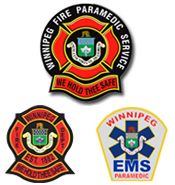911 For Seniors
Winnipeg Fire Paramedic Service Communications Operators are the public's link to Fire and Medical emergency services in times of distress and crisis.
The appropriate Fire or Medical emergency response begins with the Communications Operators. They are there to help you!
They are often the first persons involved with a Fire or Medical emergency or incident. The decisions made and the actions taken by them have a direct impact on the speed, effectiveness and safety of the response.
- Call 9-1-1 right away in an emergency. 9-1-1 is a 24-hour-a-day service. You should call immediately when an emergency occurs, even if it is in the middle of the night.
- Call 9-1-1 before calling a family member. Once help is on the way, arrangements can be made to notify your family.
- Stay on the line with the 9-1-1 call taker and answer all questions. The more information we have, the better able we are to help you.
- Try to be patient and stay calm. The call taker may need to ask additional questions while help is on the way.
- If you cannot speak, leave the phone off the hook so the 9-1-1 call taker can hear what is happening.
- Put a 9-1-1 reminder near the phone. Dialing "0" will not always connect you with an operator nearby. It may connect you with an operator many hundreds of miles away.
- Emergency responders cannot help you if they cannot find you. It is a very good idea to post your address and telephone number by your telephone. If you have moved you may accidentally recite your old address in an emergency situation, or you may have visitors who are not familiar with your address. This makes it difficult for the call taker to verify the address that appears on the computer screen.
- Post your address number on your home so responders can easily locate you in an emergency. It's best to use large, white numbers against a dark background on the outside of your home, so they can be seen from the street at any time of day or night.
- All calls to 9-1-1 are free, even from pay phones or cellular phones.
- Secure your pet in another room away from the responding crews.
- Invest in a touch-tone phone with large, easy-to-read numbers.
- Get an Emergency Response Information Kit (E.R.I.K.) or keep your medical history taped to the refrigerator in an envelope clearly marked with your doctor's phone number(s).


